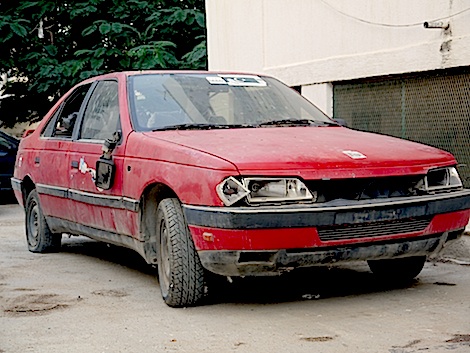By Maha Ellawati.

Benghazi, 26 November:
Libya is suffering from a vast influx of imported used cars, many of them illegal, according to . . .[restrict]the chairman of the Benghazi Local Council’s transportation committee.
Saddiq Salama Zliteni said the influx began following a decree allowing the import of used cars passed by the NTC’s executive committee, headed at the time by Mahmoud Jibril, and that subsequent efforts to reverse the decision are largely proving to be futile.
“The importing of used cars was prohibited under the former regime, but after the 17 February revolution, the Executive Council of Mahmoud Jibril issuing a decree allowing the importing of such vehicles, including those which were manufactured years ago”. Zliteni told the Libya Herald.
“Following the decision, many people took advantage of the decision and many old cars have been brought to Libya”.
Shortly after the formation of the Kib government, a new law was passed drafted by the Ministry of Economy banning the import of any vehicle manufactured in 2007 or earlier.
“These vehicles are a menace to road safey and the safety of the drivers, not to mention the impact of importing old cars on the local economy and already over-congested roads”, Saddiq Zliteni complained.
“We are obliged to uphold the law, but we have faced an uphill battle upholding this resolution owing to the lack of security and widespread availability of weapons”.
Zliteni also said that a number of sea ports were illegally flouting the law and allowing the import of these vehicles anyway.
“Of course, car merchants and others in the trade are not pleased with this decision as it hinders their business, and this also makes things more difficult”.
The local councilor refused to name which ports in particular were flouting the law, but Libya Herald sources claim that Misrata and Khoms are amongst the principal offenders, both of which are major destinations for car imports.
Obtaining an exact number for how many vehicles have been illegally imported over the past year is impossible since, by definition, these vehicles are entering the country unrecorded. However, some have estimated the number to be in the tens if not hundreds of thousands.
Over and above the threat posed to human life by renegade militias, road traffic accidents are widely assessed as being the biggest threat to security in Libya today.
Congestion on Libyan roads, in particular in the major town centres, has also become a serious issue, and one that is reckoned to be having a genuine impact on the economy.
[/restrict]






